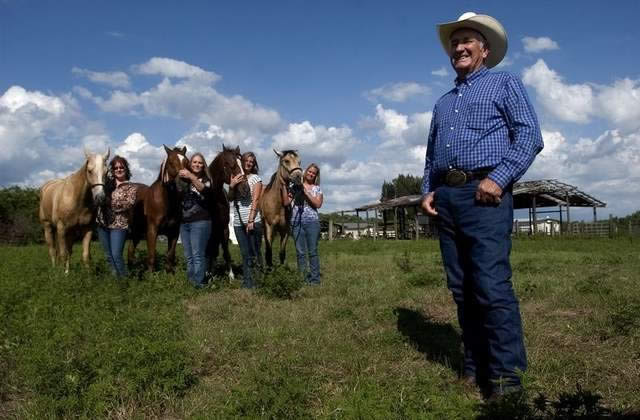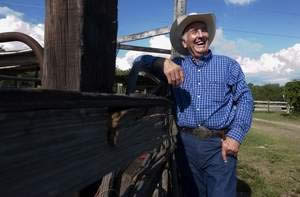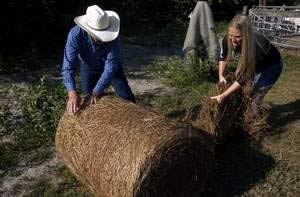
And photographs, if you have any.
Horseytalk.net Special Interview
Nial Robinson
The School teacher will spend his
summer holidays taking water to horses
before they die of thirst
To rodeo fans, he’s one of the all-time bull-riding greats.
To the kids in his science classes, he’s D-Rob.
And to 38,000 wild horses roaming Nevada, he’s a lifesaver.

Just hours after the last bell of the year rang at Riverdale High School, Southwest Florida, Nial Robinson loaded his palomino quarter horse, Lightning, into a trailer behind his red Dodge pickup and headed west.
No lazy days by the pool for him; Robinson is a man on a mission. He’ll spend his summer vacation in Nevada, working with his newly formed nonprofit group, Wild Horse Official Aid, or WHOA.
The goal: to get increasingly scarce water to mustangs before they die of thirst, something that happens all too often, the Utah-born Robinson says.
The crisis was made painfully clear to Robinson last summer. As he’d done for years, he’d left his rural North Fort Myers ranch to visit a cowboy friend in Nevada with a contract to gather wild horses living on federal land.
“It was July and we’d penned 30 horses,” he says. “They looked fine. They weren’t skin and bones or anything.”
Standard operating procedure is to let the horses rest, get a drink, sort themselves into groups. But before that could happen, something went horribly wrong. Some of the horses began weaving, staggering and falling, teeth gritted in pain. By the morning, 13 were dead.
The reason? They’d been dehydrated. The water they’d been given had killed them.
 “Their systems can’t handle it. Their brain
swells up,” Robinson says. “It’s agony
for them.”
“Their systems can’t handle it. Their brain
swells up,” Robinson says. “It’s agony
for them.”
And it was agony for Robinson, who’d grown up with horses, both domestic and wild.
“They’re just an icon of the West,” he says. “Every morning when I woke up, I could see them out there on the skyline and I developed a bond with them — with all horses.”
Before he was a teacher, Robinson rodeoed professionally. A champion bull rider, he was named the No. 1 all-around cowboy in 1968. He met Mary, a champion barrel racer from North Fort Myers, at a rodeo in Detroit.
After they married in 1971, they returned to her home and began raising quarter horses and kids. He got a job teaching and once the children had grown a bit, she began working in the schools as well. She’s now at Diplomat Middle School in Cape Coral as a student affairs specialist, a fancy way of saying she’s in charge of in-school suspensions.
“I watch the little stinkers,” she says with a laugh.
As committed to horses as her husband is, Mary is traveling with him to Nevada, where they’ll be joined by their three daughters, ranging in age from 30 to 23. It’s the first official deployment of WHOA, into which the family has plowed $25,000 of their money.
Daughter Kacie, 30, who also grew up with horses, wouldn’t have it any other way.
“The wild horses have been around so long,” she says. “We want to keep them around for future generations.”
Most of the West’s wild horses, thought to have descended from herds escaped from the Spanish, live on public ranges managed by the federal Bureau of Land Management.
 “Areas maybe as small as 15,000 to 20,000 acres
to more than a million acres,” says Alan Shepherd,
the bureau’s wild horse program manager.
“Areas maybe as small as 15,000 to 20,000 acres
to more than a million acres,” says Alan Shepherd,
the bureau’s wild horse program manager.
Those tracts can be leased by cattle ranchers who fence it, cutting horses off from the springs and watering holes they rely on. Adult horses need about 10 gallons of water a day and when it’s hot, they can lose up to four gallons an hour.
“Nevada is the driest state in the union, so water is extremely important for them. It’s a very critical need,” says Shepherd.
WHOA’s multi-pronged strategy includes:
- Setting up water tanks;
- Trucking water to horses;
- Flying it in by helicopter;
- Restoring blocked springs or streams;
- Installing solar pumps and monitors on wells, to make sure sufficient water is being pumped;
- Aerially surveying wild horse ranges to determine where water is most needed;
- Being a liaison between ranchers, the government and advocacy groups.
WHOA and the bureau are working out an agreement — Shepherd hopes it’ll be finished by June 20 — to let Robinson’s group help the feds help the horses. Because the bureau is often strapped for personnel, Shepherd thinks one of the most valuable things WHOA offers is extra helpers.
“We may have funding and clearance to do something, but if we don’t have the manpower, we can’t.
“And when we’re in an emergency situation, we need to be able to act pretty quickly. That’s where Nial’s group can come in.”






